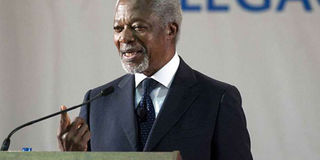How Kofi Annan redefined the United Nations

Kofi Annan, former United Nations Secretary-General, delivers the third annual Desmond Tutu International Peace Lecture, on October 7, 2013 at the University of the Western Cape, Cape Town. Annan had exceptional peace-making skills. PHOTO | RODGER BOSCH | AFP
What you need to know:
- The major global powers had full confidence in his negotiating positions, which was critical to his and Kenya’s success.
- He retired with his exceptional reputation intact and was in fact chosen to lead global efforts to defuse some of the toughest crises.
The three most globally admired leaders of the last quarter century had Africa in common — Kofi Annan, Nelson Mandela and Barack Obama.
A year has gone by since Annan left us, but those who worked under him at the United Nations still miss him. We loved him dearly.
In fact if you got to know him, he took your breath away — it didn’t seem possible that a leader could be so genuinely caring and supportive of everyone who worked for him, at any level.
And that is how he got the best from everyone, and that is how he was able to redefine the UN in a way no other Secretary-General had done before or since.
In the process he redefined himself too. It is safe to say that until he became Secretary-General, many of us who admired him did not realise how he would soar as the world’s foremost peacekeeper and what astonishing achievements he would be capable of.
It is worth noting that despite his remarkable global achievements, the one country he helped more than any other was Kenya, where his intervention was instrumental in preventing the country from spiralling into full blown civil war.
LOVED
Annan had exceptional peace-making skills, and he also had the full support of the African Union leadership, which appointed him mediator along with former Tanzanian President Benjamin Mkapa and Graça Machel, the former Mozambican Cabinet minister and First Lady to President Nelson Mandela.
The major global powers had full confidence in his negotiating positions, which was critical to his and Kenya’s success.
I think it is safe to say that Mandela apart, the world has not in recent decades produced a more loved and respected global leader than Annan, as was evidenced by the instant and genuinely-felt praise that poured in from virtually every corner of the globe at his death.
He maintained — and indeed hid — his astonishing array of achievements in the world's toughest job beneath the gentlest, most caring and self-effacing humanity imaginable.
But Annan was for sure human, and made significant mistakes. The Rwanda genocide occurred on his watch as Under Secretary-General for Peacekeeping.
GENOCIDE
But as Secretary-General, he appointed an independent inquiry under the chairmanship of Ingvar Carlsson, former Prime Minister of Sweden, to conduct an investigation into every UN failure that led to the genocide.
It is not widely known that the UN failure to arrest the genocide is what propelled Annan’s determined groundbreaking initiatives to protect civilians during conflict, such as the Responsibility To Protect.
Annan’s greatest challenge as UN chief came from the US-led Iraq war and occupation without approval from the UN Security Council.
In addition, the stated purpose of this destructive war was found to have been false: Iraq had no weapons of mass destruction.
In addition, a terrorist bombing of UN headquarters in Baghdad killed Annan’s Special Representative in Iraq, Sergio Vieira de Mello, and 21 other UN staff on August 19, 2003. I was Sergio’s Spokesman, but survived the bombing.
ONSLAUGHT
Because of all this, Annan became very despondent after the war, and eventually told the BBC that the war violated the UN charter.
That infuriated the Bush administration and there were calls for his resignation and an inquiry was set up to look into alleged corruption of the Iraq UN Oil for Food programme, which had been created to offset the severe impact of the toughest sanctions ever imposed on a nation.
Annan was not found to have played any role in the corruption.
He retired with his exceptional reputation intact and was in fact chosen to lead global efforts to defuse the toughest crises — the Syrian civil war, the ethnic cleansing of the Rohingya in Myanmar, and of course Kenya.
Mr Lone is ODM leader Raila Odinga's former adviser





